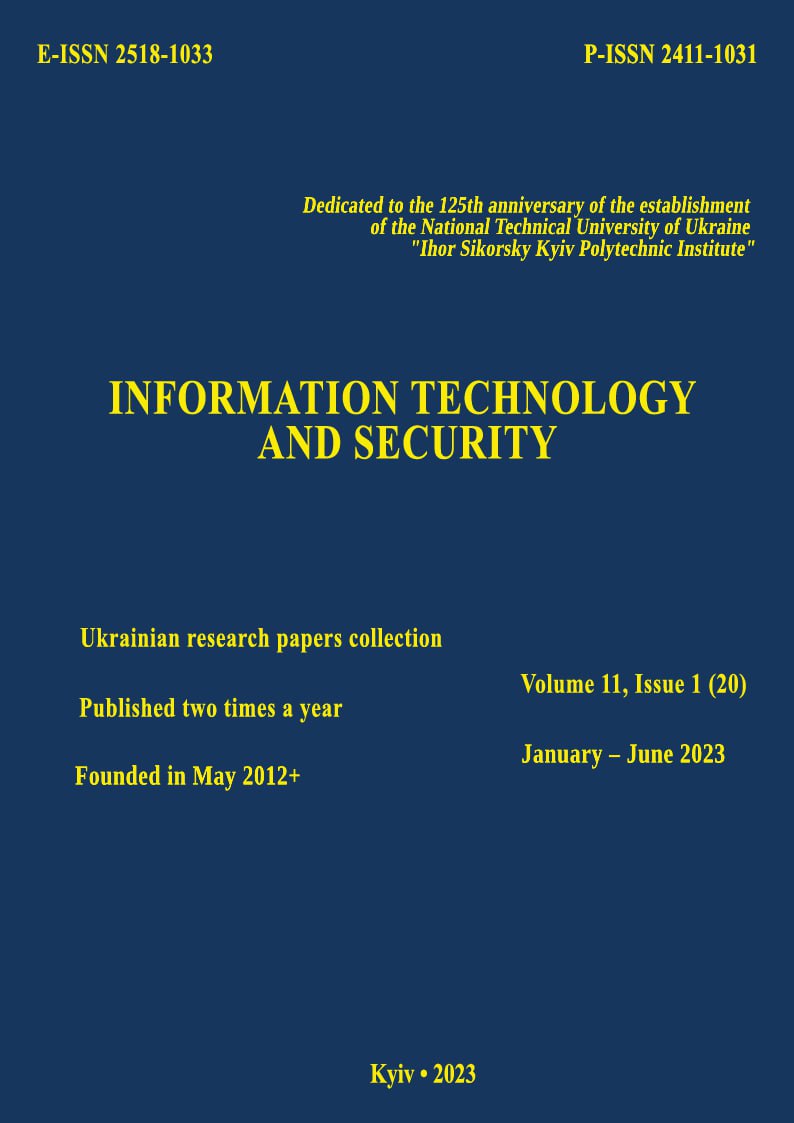Sustainable development of the system of formal cyber education: reflection of modern concepts
DOI:
https://doi.org/10.20535/2411-1031.2023.11.1.283635Keywords:
cybersecurity, formal cybereducation, cyber specialist, sustainable developmentAbstract
The article defines the conceptual framework for sustainable development of the formal cyberworld system. An analysis of contemporary regulatory, legal, and scientific sources on the preparation of cyber specialists for the security and defense sector has been conducted. The main research methods identified are synthesis, comparative analysis, focusing method, and cause-and-effect method. The new U.S. Cybersecurity Strategy addressing cyber education issues has been analyzed, which sets new requirements for cyber professionals in the context of the transformation of the global and national security environment. The use of analysis data from EU cybersecurity educational programs revealed the characteristic variability of the cybersecurity educational landscape in the EU and helped identify key gaps in the preparation of future professionals. It has been demonstrated that the integration of Ukrainian cyber education into the Euro-Atlantic educational space should occur through the updating of cybersecurity curricula based on the best international practices, the establishment of a unified system for accreditation, certification, and the development of cyber e-learning platforms for formal education. The competency-based approach in the preparation of cyber specialists is identified as a priority direction in research across various fields of knowledge. It has been revealed that there is a hysteresis of skills within the knowledge-ability-skill triad, acquired during education, in relation to the demands of advanced technologies in professional activities.
References
Z. F. Samchuk, Ideological foundations of socio-philosophical research of ideology: The problem of criteria and priorities of choice, v. 1. Dnipropetrovsk, Ukraine: ART-PRESS, 2009.
Strategy, National Cybersecurity Strategy. [Online]. Available: https://www.whitehouse.gov/wp-content/uploads/2023/03/National-Cybersecurity-Strategy-2023.pdf. Accessed on: Mar. 01, 2023.
B. J. Blažič, “Changing the landscape of cybersecurity education in the EU: Will the new approach produce the required cybersecurity skills?”, Educ. Inf. Technol., 2021, doi: https://doi.org/10.1007/s10639-021-10704-y. Accessed on: May 03, 2023.
Higher Education in Europe: Understanding the Cybersecurity Skills Gap in the EU, 2021. [Online]. Available: https://www.enisa.europa.eu/news/enisa-news/higher-education-in-europe-understanding-the-cybersecurity-skills-gap-in-the-eu. Accessed on: Feb. 12, 2023.
D. Leaser, Future of Work / The demand for cybersecurity professionals is outstripping the supply of skilled workers. [Online]. Available: https://www.ibm.com/blogs/ibm-training/new-cybersecurity-threat-not-enough-talent-to-fill-open-security-jobs. Accessed on: Apr 22, 2023.
Cyber security expert / master's program. [Online]. Available: https://www.simplilearn.com/cyber-security-expert-master-program-training-course. Accessed on: May 06, 2023.
Verkhovna Rada of Ukraine. 7th Session. (2017, Oct. 5). Law of Ukraine No. 2163-VIII, On Basic Principles of Cybersecurity of Ukraine. [Online]. Available: https://zakon.rada.gov.ua/laws/show/2163-19#Text. Accessed on: Dec. 18, 2022.
Cyber Digest. Cybersecurity Events Review, Dec. 2022. Kyiv, Ukraine: National Cybersecurity Coordination Center. [Online]. Available: https://www.rnbo.gov.ua/files/НКЦК/НКЦК-1/Cyber%20digest_December_2022.pdf. Accessed on: Jan. 18, 2023.
D. Dubov, U.S. National Cybersecurity Strategy 2023: Critical Infrastructure, Coordination, Proactivity. Policy Brief. Kyiv, Ukraine: National Institute for Strategic Studies, 2023.
Verkhovna Rada of Ukraine. 6th Session. (2021, Dec. 17). Law of Ukraine No. 1986-IX, On Amendments to Certain Laws of Ukraine on Military Education and Science. [Online]. Available: https://zakon.rada.gov.ua/laws/show/1986-20#Text. Accessed on: Apr. 19, 2023.
Ministry of Defense of Ukraine. (2021, Dec. 15). Policy of the Ministry of Defense of Ukraine in the field of military education. [Online]. Available: https://www.mil.gov.ua/content/education/politika_mou_osvita.pdf. Accessed on: Apr. 19, 2023.
National Security and Defense Council of Ukraine. (2021, Dec. 30). Decision of the National Security and Defense Council of Ukraine “On the Implementation Plan of the Cybersecurity Strategy of Ukraine”. [Online]. Available: https://zakon.rada.gov.ua/laws/show/n0087525-21#Text. Accessed Apr. 23, 2023.
National Security and Defense Council of Ukraine. (2020, Sep 14). Decision of the National Security and Defense Council of Ukraine “On the National Security Strategy of Ukraine”. [Online]. Available: https://zakon.rada.gov.ua/laws/show/n0005525-20#Text. Accessed Apr. 27, 2023.
D. Kuleba, The War for Reality. How to win in the world of fakes, truths and communities. Kyiv, Ukraine: Knyholav, 2022.
Y. Danyk, and O. Korneiko, “Fundamentals methodology of formation cyber competences at security sector experts and Ukraine defense”, Information Technology and Security, vol. 6, no. 2, pp. 105-123, 2018, doi: https://doi.org/10.20535/2411-1031.2018.6.2.153495.
Y. Shchavinsky, O. Levchuk, V. Levchuk, and O. Syrsky, “Organizational, technical and legal aspects of the formation of competencies of military specialists”, Military Education, no. 2 (46), pp. 311-324, 2022, doi: https://doi.org/10.33099/2617-1783/2022-46/311-324.
T. Holth, and O. Boe, “Lost in transition: The dissemination of digitization and the challenges of leading in the military educational organization”, Frontiers Psychol., vol. 10, 2019, doi: https://doi.org/10.3389/fpsyg.2019.02049.
Downloads
Published
How to Cite
Issue
Section
License
Copyright (c) 2023 Collection "Information Technology and Security"

This work is licensed under a Creative Commons Attribution 4.0 International License.
The authors that are published in this collection, agree to the following terms:
- The authors reserve the right to authorship of their work and pass the collection right of first publication this work is licensed under the Creative Commons Attribution License, which allows others to freely distribute the published work with the obligatory reference to the authors of the original work and the first publication of the work in this collection.
- The authors have the right to conclude an agreement on exclusive distribution of the work in the form in which it was published this anthology (for example, to place the work in a digital repository institution or to publish in the structure of the monograph), provided that references to the first publication of the work in this collection.
- Policy of the journal allows and encourages the placement of authors on the Internet (for example, in storage facilities or on personal web sites) the manuscript of the work, prior to the submission of the manuscript to the editor, and during its editorial processing, as it contributes to productive scientific discussion and positive effect on the efficiency and dynamics of citations of published work (see The Effect of Open Access).

